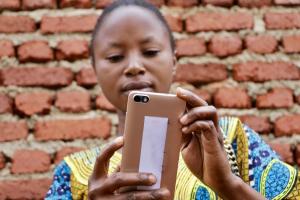Battling COVID-19 rumours and hoaxes in Angola
Luanda – “COVID-19 doesn’t kill anybody in Angola as we are immune due to malaria,” so goes one of the myriad falsehoods about the pandemic in the southern African country.
Misinformation and rumours have constantly cast a pall on the fight against COVID-19. In July, the World Health Organization (WHO) office in Angola and the Ministry of Health set up the COVID-19 Alliance – a system to fight the surge of potentially harmful misinformation shared mostly online.
The COVID-19 Alliance tracks and analyses conversations around the pandemic on social and traditional media and rebuts misleading information. Regular updates and key messages about the disease are also published on its website, shared on social media and through its own WhatsApp platform.
Rumours tracked by the platform relate mainly to mentions of disease, testing, treatment, vaccine and response by local authorities and partners. "When I heard that I had to drink alcohol or eat garlic to avoid COVID-19, I was more scared than relieved because I knew that was not true," says Denise Miranda, who lives in the capital Luanda.
"Sometimes it is frightening to see how fake and yet creative the circulating rumours are,” says Elchadai Destino, a regular user of the COVID-19 Alliance platform who received a WhatsApp message encouraging people to disregard preventive measures on claims that the disease was no longer dangerous.
Popular myths on the COVID-19 misinformation landscape in Angola include warnings against child polio vaccination because it is an experiment for COVID-19 vaccine, or that the disease does not exist in the country, and hoaxes about winning a COVID-19 sweepstake by calling a given number.
"Access to officially verified information is critical regarding COVID-19 prevention as well as when it comes to ensuring the good health of the population,” says Dr Djamila Cabral, WHO representative for Angola. "Promoting access to correct information and battling misinformation contributes to a better participation of the population in the response to this unprecedented pandemic.”
The COVID-19 Alliance system receives around 100 calls a day from people seeking to clarification on rumours, accessing tests, facts about the disease and how it is transmitted as well as preventive measures.
Lizandro Chissupa, the head of the technology firm managing the COVID-19 Alliance platform, is confident that the initiative will help “diminish the impact of misinformation in our country and to guide people take the right preventive measures.”
Angola has integrated infodemic management in its response to end the COVID-19 pandemic. In the African region, WHO, partner organizations and fact-checking groups have launched an alliance to track and counter misinformation on the pandemic and other health emergencies.
Dr Cabral affirms that WHO in Angola will continue supporting the Ministry of Health to bolster infodemic management and other measures to promote public health awareness.
“Misinformation can lead to confusion and ultimately distrust in governments and the public health response,” she says. “We will continue to support the implementation of key interventions that provide citizens with clear information based on evidence and which leads to positive health behaviours.”
Oficial de Comunicação
Escritório da OMS em Angola
gamboo [at] who.int (gamboo[at]who[dot]int)
T: +244 923 61 48 57
Communications and marketing officer
Tel: + 242 06 520 65 65 (WhatsApp)
Email: boakyeagyemangc [at] who.int (boakyeagyemangc[at]who[dot]int)



